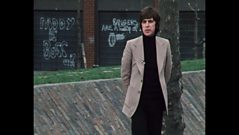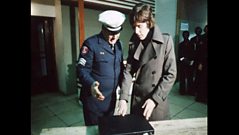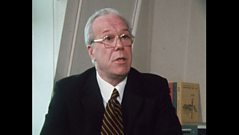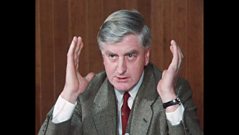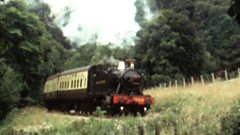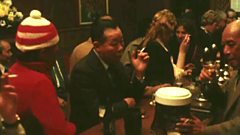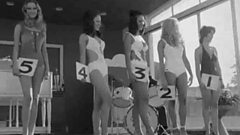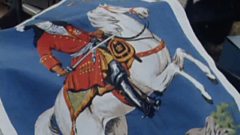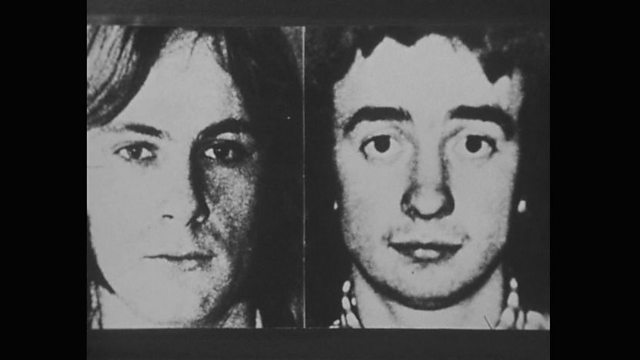
Paul Hill and Gerry Conlon
John Stapleton reports on the background of Paul Hill and Gerry Conlon, serving sentences for the Guildford pub bombings. He describes them as PIRA terrorists. They were exonerated in 1989.
John Stapleton reports on the background of Belfast men Paul Hill and Gerry Conlon; as they were both serving sentences for the Guildford pub bombings Stapleton reports the established view of the time that they were Provisional Irish Republican Army (PIRA) terrorists.
Please see below for context on Guildford pub bombings.
Paul Hill and Gerry Conlon attended St. Peter’s Secondary Intermediate School in Belfast – there is news footage of the school and pupils outside.
The boys left school as the Troubles were beginning in Northern Ireland, Stapleton states that, “Their adolescence was spent in an atmosphere of hatred and violence”.
Shots of young boys throwing stones at army vehicles follow; a group of boys sing the republican protest song, The Men Behind The Wire, about internment without trial introduced by Northern Ireland Prime Minister Brian Faulkner in August 1971
Hill and Conlon spent some time on the dole and made several trips to England; Stapleton alleges that they were lieutenants in the Provisional Irish Republican Army (PIRA) and that they were sent to England to carry out the Guildford pub bombings.
Stapleton visits a Church hostel that Hill and Conlon stayed in. The priest who ran the hostel has since said that neither man gave him the slightest indication that they were politically motivated; he described them as ‘sad and pathetic’.
Bob Huntley, a former Commander of the Bomb Squad, advises landladies and neighbours to take note of any unusual movements of tenants and neighbours and to bring their suspicions to the police.
SCREEN GOES BLANK BUT AUDIO CONTINUES
Stapleton states that while Hill and Conlon were only in London for a few weeks before carrying out the Guildford bombings (they have since been found innocent, see Context below), terrorists these days send highly trained specialists to London several months before an attack. The idea being that these specialists can absorb themselves into the community and awaken people known as sleepers.
CONTEXT
On 5 October 1974 the Provisional Irish Republican Army (PIRA) targeted Guildford, Surrey, because it was situated close to a number of garrison towns. The PIRA planted two six-pound gelignite bombs in two pubs. The first exploded just before 9.00pm in the Horse and Groom, destroying the front of the building and shattering the windows of neighbouring shops.
It killed Paul Craig, a plasterer (22 years old); two members of the Scots Guards, William Forsyth (18) and John Hunter (17); and two members of the Women’s Royal Army Corps, Caroline Jean Slater (18) and Ann Ray Hamilton (19). A further sixty-five persons were wounded.
After the first explosion, other public houses were evacuated, including the Seven Stars where the second bomb exploded at approximately 9.35 pm without causing any serious injuries.
On November 7 1974 in Woolwich Gunner Richard Dunne, a soldier (42) and Alan Horsley, a sales clerk (20) were killed when a PIRA bomb exploded in the King’s Arms. Twenty-six people, including five soldiers, were injured.
In December 1974 the police arrested three men and a woman: Gerry Conlon, Paul Hill, Patrick Armstrong and Carole Richardson. In October 1975 these four were convicted of the Guildford and Woolwich bombings and given life sentences. The group was known as the Guildford Four.
On 4 March 1976 the Maguire Seven were convicted of making the explosives used in these bombings.
The Maguire Seven were: - Anne Maguire, Patrick Maguire (Anne’s husband), Patrick Maguire (son of Anne and Patrick), Vincent Maguire (son of Anne and Patrick), Sean Smyth (brother of Anne), Patrick O’Neill (family friend) and Giuseppe Conlon (brother of Anne Maguire and father of Gerry Conlon).
Over the years, the cases of the Guildford Four and the Maguire Seven came under increasing legal scrutiny and the range of those seeking a review of the convictions extended widely. On 17 October 1989 it was announced that corruption proceedings would be taken against the police involved in the conviction of the Guildford Four. Two days later, with the exception of Paul Hill, those convicted for the bombings were released. This followed an announcement by the Director of Public Prosecutions that it would be wrong for the Crown ‘to seek to sustain’ the convictions of 1975 on the basis of confessions that were later retracted.
The Court of Appeal had decided that the DPP in 1975 had suppressed scientific evidence which conflicted with the confessions. Paul Hill remained in custody because he was implicated in a case that had not yet been resolved. His conviction was eventually quashed in April 1994.
On 26 June 1991 the Court of Appeal overturned the sentences on the Maguire Seven – all of whom had completed their sentences.
Afterwards many criticised the court for dismissing most of the grounds of appeal and for simply concluding that the hands of the convicted could have been innocently contaminated with nitro-glycerine.
Duration:
This clip is from
More clips from 02/04/1976
-
![]()
Alleged bomb factory
Duration: 02:25
-
![]()
Bombing of the 1976 Ideal �������� Exhibition
Duration: 03:38
-
![]()
Terrorists in London
Duration: 02:13
-
![]()
The continuing danger from PIRA bombs
Duration: 01:43
More clips from Nationwide
-
![]()
A Passion for Steam Trains—23/09/1975
Duration: 10:35
-
![]()
Eddie Braben on Liverpool—10/09/1979
Duration: 13:44
-
![]()
Southend Holiday—24/08/1973
Duration: 10:25
-
![]()
Scarva—10/07/1981
Duration: 08:28

